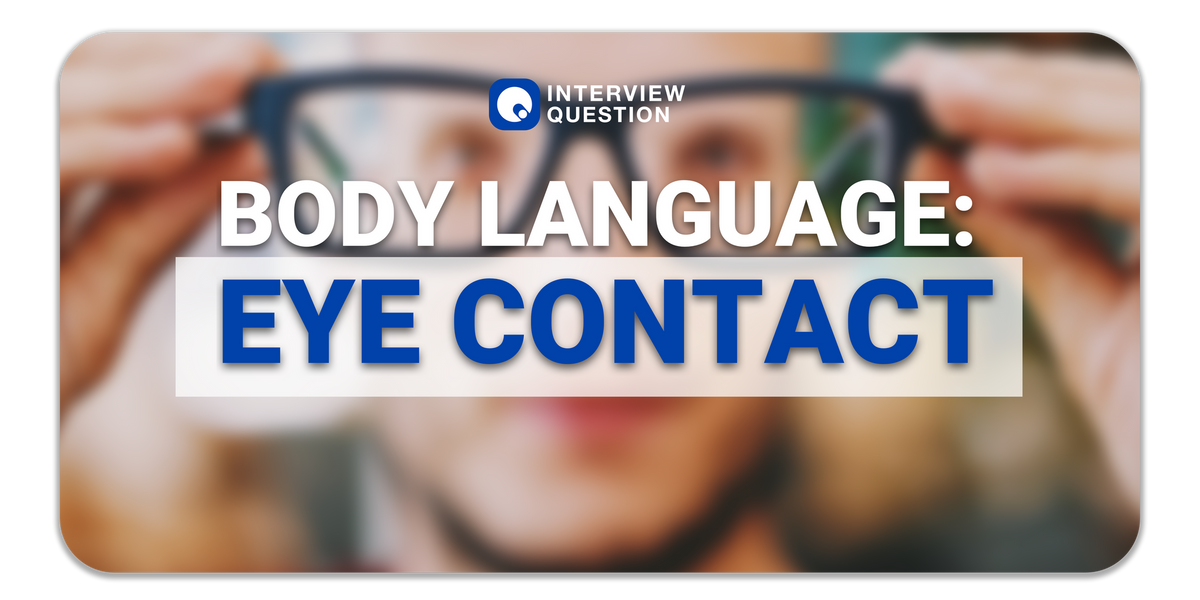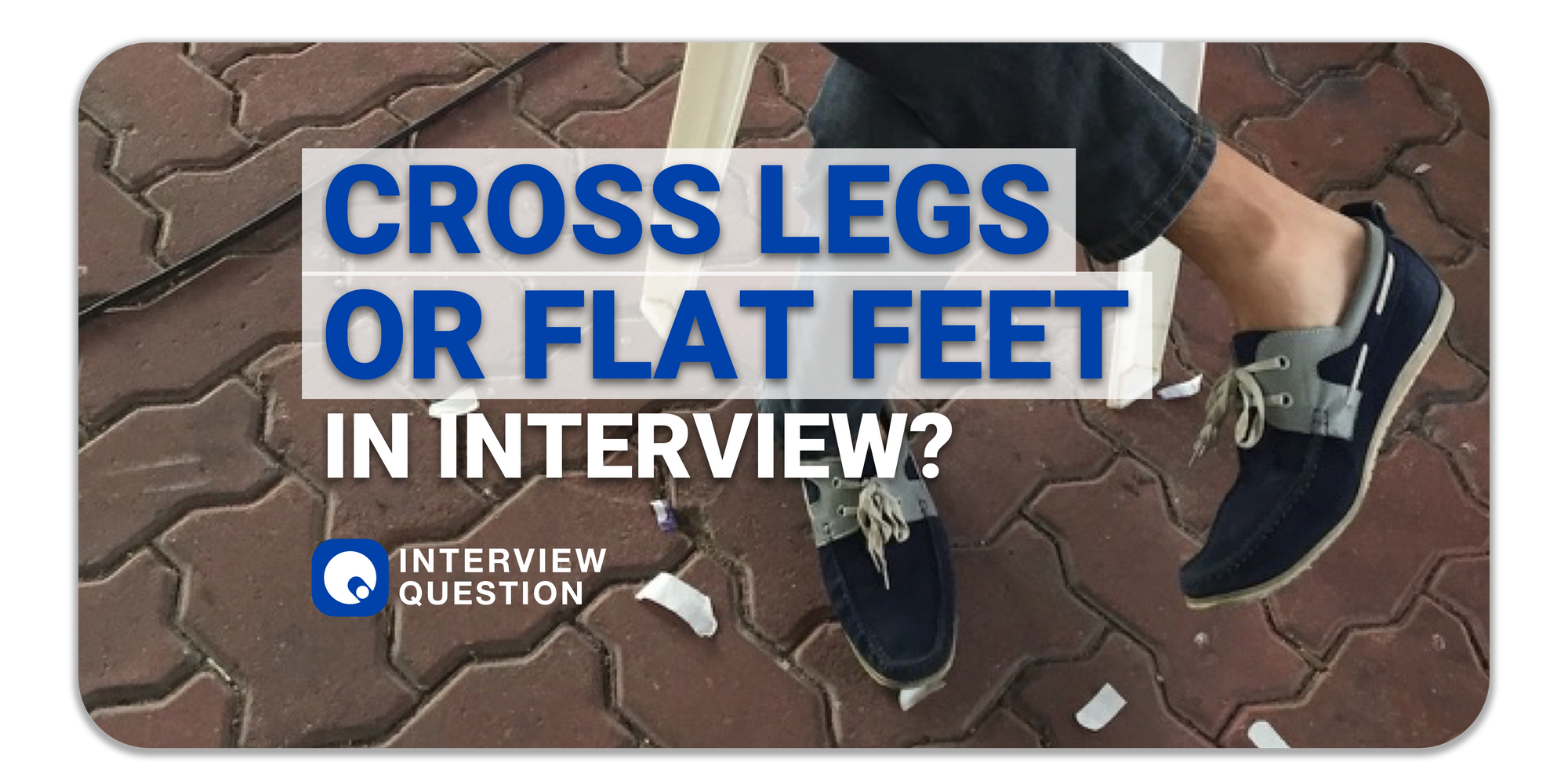Maintaining Eye Contact in An Interview: Proper Body Language
• Body Language • Staring • Enlarged Pupils • Talking + Eye Contact • Duration of Contact • Look Up (or Down?) • Anxiety & Avoidance • Breaking the Eye Contact • Video Interview • Goals • Improving

Eye contact is important in an interview because it shows confidence. It also shows that you are listening and engaged in the conversation. The next paragraphs detail major points you need to observe to demonstrate proper body language while in an interview.
Why is Maintaining Eye Contact Important in an Interview
Maintaining good eye contact is essential in an interview because it can help you build rapport with the interviewer. By having a good eye contact, you can show him or her you are engaged in the conversation and interested in what he or she has to say. People with good eye contact can also earn the interviewer's trust. The interviewer will be satisfied that he or she is talking to someone who is interested in what he or she is saying and has all the time in the world for him or her. If your eye contact isn't good, then you might as well not have bothered attending at all because you are only there to wait for your interviewer.
Eye Contact as a Part of the Whole Body Language
The eyes are one of the most important parts of body language that is often overlooked. Don't overlook eye contact when you are watching a friend, colleague or anyone else for that matter. It's all about how you use your body language when speaking with someone else. During an interview, it's all about reading the interviewer's body language and what it says about yourself in return. A better way to improve your body language is to practice it in front of a mirror.
Sometimes, candidates find it difficult to keep eye contact when being interviewed. They may even feel as if they are looking into the interviewer's soul. The meaning of their words gets lost on them due to this and they become nervous and self-conscious.
Look, but Don't Stare
Intense eye contact is perceived to be a stare. Staring at someone for too long can then lead them to believe that you are bored or upset with them, which is likely not the case and not the impression you are trying to make.
Most of the time, the interviewer's gaze should help you relax, make you more comfortable and promote open communication. This is meant to make you feel at ease so you can deliver genuine responses and the interviewer can effectively assess you.
On the opposite end, if the interviewer's stare is prolonged for too long, it can be uncomfortable for the interview candidate.
In an interview, the interviewer's prolonged stare can be used as a technique to assess whether or not you really want to be there. This could mean that you are telling the truth about your desire to work with them.
Another reason for the stare is that she is trying to see if her question had been understood.
Staring is rude and agressive. Don't make this common mistake.

Enlarged Pupils
During an interview, if a candidate's pupils dilate (the black or dark part becomes bigger) when they talk about themselves, it is a sign of trust and interest. It reveals the desire and also intensity of the meaning of your words.
As the saying goes "eyes are the window of your soul" - this technique reveals your interest in the position and will tell the interviewer how keen you are on discussing the job with her.
Make Eye Contact When Talking
It does no good if only one person makes eye contact while talking to each other. When you are speaking, you should hold your gaze on the interviewer's eyes when he or she is talking and looking at you.
If you are not looking at the interviewer, he or she will assume that you are not paying attention and will be less likely to listen to you. However, this is a good way of showing you are interested in what the interviewer has to say.
Duration of Eye Contact (How Long?)
Hold your gaze while the interviewer is speaking, but glance away for half to one seconds after he or she stops speaking.
If you find yourself constantly looking at the interviewer while he is talking, it is recommended that you should look down at your notes (or forms, etc).
At any one time, you should throw soft looks at the interviewer, and tracking motions using your eyes should be limited up to 10 seconds.
Looking Up Versus Looking Down
When the interviewer is speaking, you should look at him or her when he is talking and looking at you. You can look up at the ceiling/floor when your mind wanders or you are thinking of something to say.
The direction you are looking at when you are giving your answer to the interviewer can also mean something.
Looking up means you are thinking of something to say while looking down shows you are really concentrating on the question. Further, when you look up, it shows interest and when you look down, it shows confidence.
Breaking the Eye Contact
You should break eye contact every now and then to show you are enjoying the conversation and keep from appearing too intense. Breaking eye contact also engages your brain in the conversation, which makes you think of what to say. You need to break eye contact to do this and make eye contact again for a quick moment before breaking it again.
Getting Rid of Uncomfortable Eye Contact
There could be several reasons for you to feel uncomfortable about maintaining eye contact with the interviewer. If this happens, just look at the floor and check out your surroundings. You can do this without being seen by the interviewer. To avoid being seen by the interviewer, you should look at something far away. This is another way of breaking eye contact without seeming rude.
Eye Contact Anxiety & Avoidance
Sometimes you may feel anxious about maintaining eye contact with the interviewer without any apparent reason. You should keep in mind that there are no reasons for avoiding eye contact. Don't be afraid to meet his gaze and keep yourself from looking away. If you feel too nervous, it could be a good idea to look away towards the door and get your bearings before looking back at the interviewer again.
In salary negotiations, you composure tells alot about you, so don't let it get to you.

Eye Contact Between A Man & A Woman
The opposite sex can also make you nervous, which in turn makes it harder for you to maintain eye contact. However, if the interviewer is of the opposite sex, it is not necessary to avoid looking into his or her eyes; just remember to look away every now and then.
Don't stare at attractive areas or give the appearance that you are uncomfortable with his or her presence. You can raise the paperwork to your shoulder level to physically block the distractions.
On the other hand, don't flirt or give unintended signs of attraction. Remember that you are being looked at and evaluated by the interviewer because you want to work for him or her.
Exercises You Can Do to Improve Your Eye Contact
You can practice maintaining eye contact with other people, including family members, friends, and even co-workers. Talk to them about stuff that you normally would.
This exercise will improve your eye contact because you get to practice in a relaxed and familiar environment. It will also help you become comfortable with it before the real thing on an interview day.
Eye Contact During Video Interviews
A video interview is still a facial-to-face conversation between the interviewer and the candidate using the internet. You can use the same techniques as in face-to-face interviews, but you need to maintain eye contact with the camera and not the computer screen. Looking at the other person's eyes on the screen is not enough because they are distorted by the monitor.
Especially in Zoom meetings with multiple participants, the lag can cause you to lose eye contact with the other person. So you will need to look at the other person for a few seconds in order to account for the delay and maintain eye contact.
Your Goals in Achieving Good Eye Contact
Here are some sample goals you can use to achieve good eye contact:
- To look into the interviewer's eyes without making you nervous.
- Be confident and comfortable when you make eye contact.
- To appear friendly and honest when you look at him or her. You should also note how the interviewer is looking at you. If your eyes meet, hold his gaze for a few seconds before breaking it; if they do not, don't try to hold the stare at all costs but don't avoid it either.
- To show interest in the interviewer and his or her questions without making him or her uncomfortable with an excessive amount of eye contact.
3 Ways to Improve Your Eye Contact During Interviews
- Practice - Choose a person with who you feel comfortable and ask him/her to give you honest feedback after every few times of practice.
- Do role-plays - If you are familiar with the scenario, do role plays with a friend or family member so that you can practice as if you are in an interview.
- Practice with a mirror - This will help you monitor your eye contact and other non-verbal gestures.
Also: Pair good eye contact with proper seating posture to look decent and presentable.


